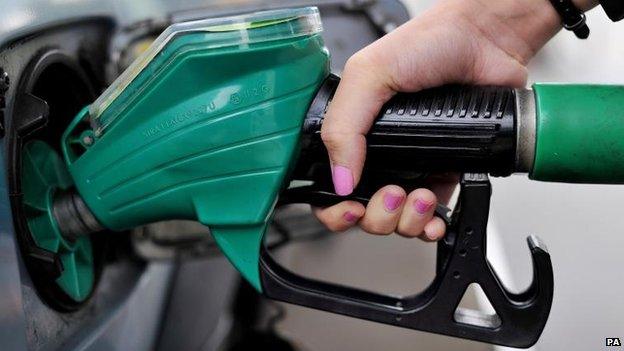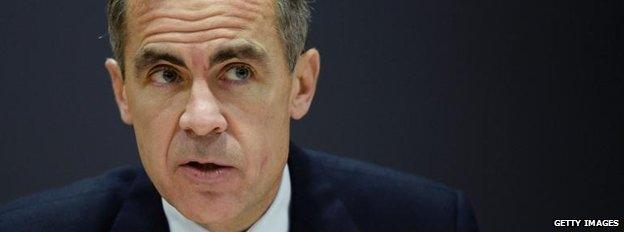Could 'good' low inflation become 'bad' deflation?
- Published
- comments

Fuel costs have fallen by more than 10% in the past year
Gentle inflation is a spur to spend - because if you've got the money and you're not feeling gloomy, then you will spend today, because tomorrow prices might be a bit higher.
It is also a spur to borrow for investment, in a home if you are a household or in productive kit if you are a business, because if you think your earnings will at least rise in line with inflation, then the burden of your debt will diminish with passing years.
So moderate inflation tends to be associated with steady growth in national income - of the sort that should make us sustainably richer
That is why the government has set a target for the Bank of England of setting monetary conditions - through changes to the interest rate for lending to banks and via quantitative easing - to keep inflation at 2%, with a one percentage point margin of error on either side of 2%.
So with CPI inflation today announced at 0.5% for December - the joint lowest since records began in 1989 - the Bank of England has failed.
And for the first time ever it has failed because inflation is too low (it missed the target on the upside well over 30 times after 2007).
Now as I said yesterday, that failure is - arguably - good news, at least in the short term.
That is because what has been driving inflation lower has been a 10.5% fall in motor fuels over the past year and a 1.9% fall in food prices. And since we have to buy food and fuel, those reductions increase our spending power, they make our money go further - they are the equivalent of a lovely hefty tax cut (of the kind that the chancellor would love to give us but can't afford).
It is also worth pointing out that food and fuel prices are set - to a great extent - by global supply and demand, and cannot be influenced more than a bit by how cheap or expensive the Bank of England tries to make the pound.
But that doesn't mean falling prices can be blithely ignored.
There are fears that endemic falling prices, or Japanese-style deflation, could become long-lasting and intractable in the eurozone.
And right now we in the UK are likely to ship in disinflation or downward pressure on prices from the eurozone - because the European Central Bank's determination to make money as cheap as possible means that the pound will go much further when buying goods and services priced in euros.
The point is that annual inflation of 0.5% here is not much of a buffer against deflation. And we've already seen three consecutive months in the UK of deflation in clothing and footwear, and almost no inflation in furniture.
As I have been banging on about, if we became accustomed to prices falling as the new norm, we would spend less - in that delaying would always make our money go further. And then the economy would sclerotic and stagnant, and desperately difficult to reinvigorate.
Given the disinflationary impact of the UK's record debt burden (the sum of household, corporate, financial and government debt), it is not inconceivable that "good" low inflation could become "bad" deflation.
How grave is that danger? Well I am on my way to see the governor of the Bank of England to ask him just that.

UPDATE 11:55
I have just interviewed the governor of the Bank of England.
Mr Carney says he expects inflation to fall further, as petrol prices are reduced to catch up with the tumbling oil price.
But his current assessment is that the reduced food and energy prices are an economic stimulus - because, as I mentioned earlier, they boost our spending power.
He said that conditions in the eurozone were more deflationary than here, citing its much higher unemployment rate and stagnant wages.
That said Mr Carney said it was not impossible that the falls in energy and food prices could infect other sectors - such that growth-killing deflation could become a more clear and present danger.
The Bank had the tools to deal with that risk, he said, to nudge inflation back towards the 2% target.
Evasive action, if needed, would be by keeping interest rates at these record low levels for a bit longer, he said, rather than engaging in more money creation through quantitative easing.
He wanted to stress that the Bank still expected to "normalise" interest rates, or raise them gently, within the foreseeable future.